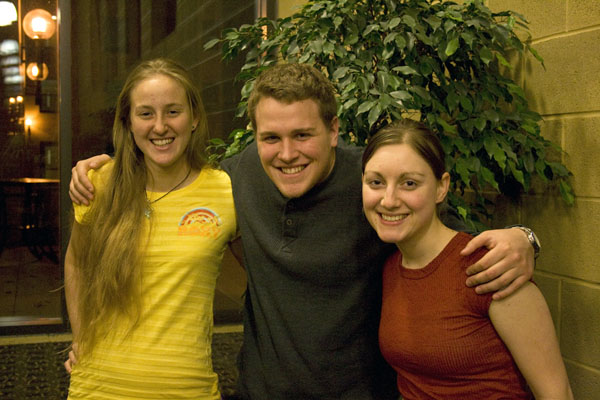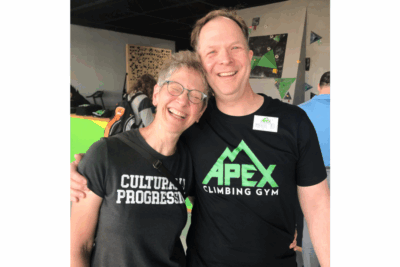Wednesday evenings in the Yoder residence hall last semester were fight nights. Fifty students crowded into the second-floor lounge, pulsing in a ring around two boxers.
Levi Yoder, the sophomore who organized the event, described the tentative first few blows. For the mostly Mennonite students, it was “unnatural for people to hit each other,” according to Yoder.After the first blow to a face, though, the opponents lost any reservations and dove in, pummeling their aggression away. “They just started duking it out,” Yoder said, laughing.
“Certain events brought the floor together, and one of them was boxing nights,” Yoder continued. “For a little while you could forget about everything else. Plus, it was always fun to see the underdog win.”
Yoder is one of Goshen College’s eight new ministry leaders. Known around campus as MLs, Yoder and his fellow members each take their own approach to community building.
One ministry leader collaborated with a resident assistant to plan a weekend retreat at a cabin; one hosted tea and back rub parties. Another encouraged her floormates to participate in an intergenerational quilting project with College Mennonite Church.
Some have volunteered with food drives or baked cookies for children’s welfare centers. Yet others arrange weekly Bible studies and coordinate campus worship nights every Wednesday, which draw about 20-30 people.
Last semester, Yoder sensed that “some people’s egos were getting bruised,” and now leads a small group on Wednesday evenings instead.
In previous school years, a few students helped with chapels, worship nights and small groups. One of those leaders started to guide some intentional conversations with students about improving spiritual life at Goshen. According to Tamara Shantz, one of the campus pastors, “They realized that … spiritual formations were mostly in informal conversations.”
Shantz and Bob Yoder, another campus pastor, knew that growth happened in residence halls and in late night interactions. “Formal settings make it less easy to be open,” Shantz continued, “and if Bob and I show up, it’s immediately formal.”
They decided to appoint ministry leaders in the residence halls to complement the resident assistants – “someone to go talk to about life and someone to process it with,” Shantz said.
People drop by Levi Yoder’s room to talk. However, Yoder said, “The girls have had more one-on-one contact. Girls just by their nature tend to talk more and be more open about their feelings – especially when it comes to religion.”
Yoder was challenged to come up with events that could gather a substantial turnout. “Doing common activities together is a lot less common for guys,” he said.
Heather Zimmerman, a sophomore ministry leader from Guam, leads a prayer group on Monday evenings. It is called “E4” after Ephesians 4, and it meets for about an hour. “Everyone shares and strengthens each other,” Zimmerman said. “Last night we had a good-sized group. We talked about testimonies.”
Zimmerman contrasted her position to a resident assistant’s. “If someone’s been drinking, it’s the RA’s job to visit their room and say, ‘You’re getting written up, dude,'” Zimmerman said. “I’d rather be like, ‘Why are you getting hammered all week?’ and give them someone to talk to.”
She continued, “I see people’s lives change. It changes you more than the people you talk to. I ask myself, ‘How am I going to see God make a difference in my life and other people’s lives today?'”
Students who want to serve as ministry leaders are proof of the program’s success, Shantz said. “Applicants are doing it,” she said, “because of the impact that MLs had on them this year.”



